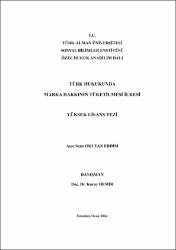Türk hukukunda marka hakkının tüketilmesi ilkesi
Citation
Erdim, Ayşe Sena Okuyan (2024). Türk hukukunda marka hakkının tüketilmesi ilkesi. Türk-Alman Üniversitesi, Sosyal Bilimler Enstitüsü, İstanbul.Abstract
Fikri mülkiyet hakları rekabeti ve yenilikçiliği teşvik eden, sahibine münhasır
yetkiler sağlayan haklardır. Ancak bu haklara yönelik mutlak sınırsız bir koruma
problemlere yol açabilmektedir. Bu sebeple öğretide bu hakların sınırlandırılması
gündeme gelmiş ve fikir ile emeğin korunması ile toplumsal yarar arasında bir denge
sağlanmak istenmiştir. İşte bu bağlamda “hakkın tükenmesi ilkesi” ortaya çıkmıştır.
Özellikle marka hakkı bu ilke kapsamında öne çıkan haklardan biridir. Marka hakkının
tükenmesi ilkesine göre; marka sahibinin kendisi ya da onun izniyle üçüncü bir kişi
tarafından ürünler piyasaya sunulduğu takdirde, artık bu ürünlerin piyasadaki dolaşımına
hak sahibi tarafından müdahale edilememektedir. Öğretide ulusal, bölgesel ve uluslararası
olmak üzere üç tür tükenme rejimi bulunmaktadır. Ülkemiz 6769 Sayılı Sınai Mülkiyet
Kanunu ile bu ilkelerden uluslararası tükenme ilkesini benimsemiştir. Paralel ithalata da
izin veren bu ilkeye göre mallar marka sahibinin rızası dahilinde coğrafi sınırlama
olmaksızın herhangi bir yerde bir kere piyasaya sunulduğunda o mallara ilişkin haklar
tükenmekte, malların üçüncü kişiler tarafından paralel ithalatına hak sahibi
karışamamaktadır. Intellectual property rights encourage competition and innovation, also provide
exclusive powers to the owner. However, absolutely unlimited protection of these rights
may cause some problems. For this reason, limiting these rights was brought to the agenda
in the doctrine and a balance was sought between the protection of ideas, labor and social
benefit. In this context, the "principle of exhaustion of rights" has emerged. In particular,
trademark right is one of the prominent rights within the scope of this principle.
According to the principle of exhaustion of trademark rights; If products are put on the
market by the trademark owner himself or by a third party with his permission, the
circulation of these products in the market can no longer be interfered with by rightholder.
There are three types of extinction regimes in the doctrine as national, regional and
international. Our country has adopted the international exhaustion principle among these
with the Industrial Property Law No. 6769. According to this principle, which also allows
parallel imports, once the goods are put on the market anywhere without geographical
limitation with the consent of the trademark owner, the rights regarding those goods are
exhausted and the owner of the right cannot interfere with the parallel import of the goods
by third parties.
Collections
- Tez Koleksiyonu [25]

















